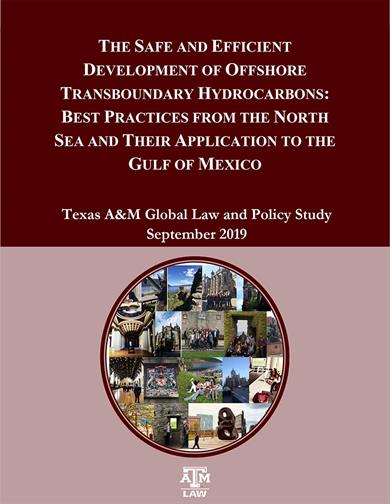September 2019
Project Director:
Guillermo Garcia Sanchez, Professor, Texas A&M University School of Law
Authors:
Elise Aldendifer, McKenzie Coe, Taylor Faught, Ian Klein, Peter Kuylen,
Keeli Lane, Robert Loughran, Kristin Newby, Morgan Parker, Megan Pharis,
John Thomas, and Braxton Wood
 Offshore hydrocarbon resources have been developed for many decades. With technology improvements, many fields which were once impossible to develop, are now economically and technologically feasible. This has led to a growing difficulty in determining the legislative and regulatory framework for resources that straddle the recognized borders between two states. In this paper, we examine a successful framework agreement governing the transboundary resources between the United Kingdom (“U.K.”) and Norway in the North Sea, and the agreement between the United States and Mexico governing the Gulf of Mexico. Following the 2013 Energy Reform, the Mexican energy sector has been revitalized, leading to greater exploration, development, and production than ever before. This means that in the near future transboundary resources may be licensed for production, bringing the issues highlighted in this paper to the attention of multiple government and international entities. This paper seeks to recommend improvements to the transboundary framework in the Gulf of Mexico based on the successful framework agreement utilized in the North Sea.
Offshore hydrocarbon resources have been developed for many decades. With technology improvements, many fields which were once impossible to develop, are now economically and technologically feasible. This has led to a growing difficulty in determining the legislative and regulatory framework for resources that straddle the recognized borders between two states. In this paper, we examine a successful framework agreement governing the transboundary resources between the United Kingdom (“U.K.”) and Norway in the North Sea, and the agreement between the United States and Mexico governing the Gulf of Mexico. Following the 2013 Energy Reform, the Mexican energy sector has been revitalized, leading to greater exploration, development, and production than ever before. This means that in the near future transboundary resources may be licensed for production, bringing the issues highlighted in this paper to the attention of multiple government and international entities. This paper seeks to recommend improvements to the transboundary framework in the Gulf of Mexico based on the successful framework agreement utilized in the North Sea.
This study is the work product of students enrolled in the Texas A&M University School of Law Global Lawyering Field Course, Scotland: Natural Resource Management and Dispute Resolution led by Professor Randy Gordon and Professor Guillermo Garcia Sanchez in 2018.
- To download the report, please click here or on the report image.